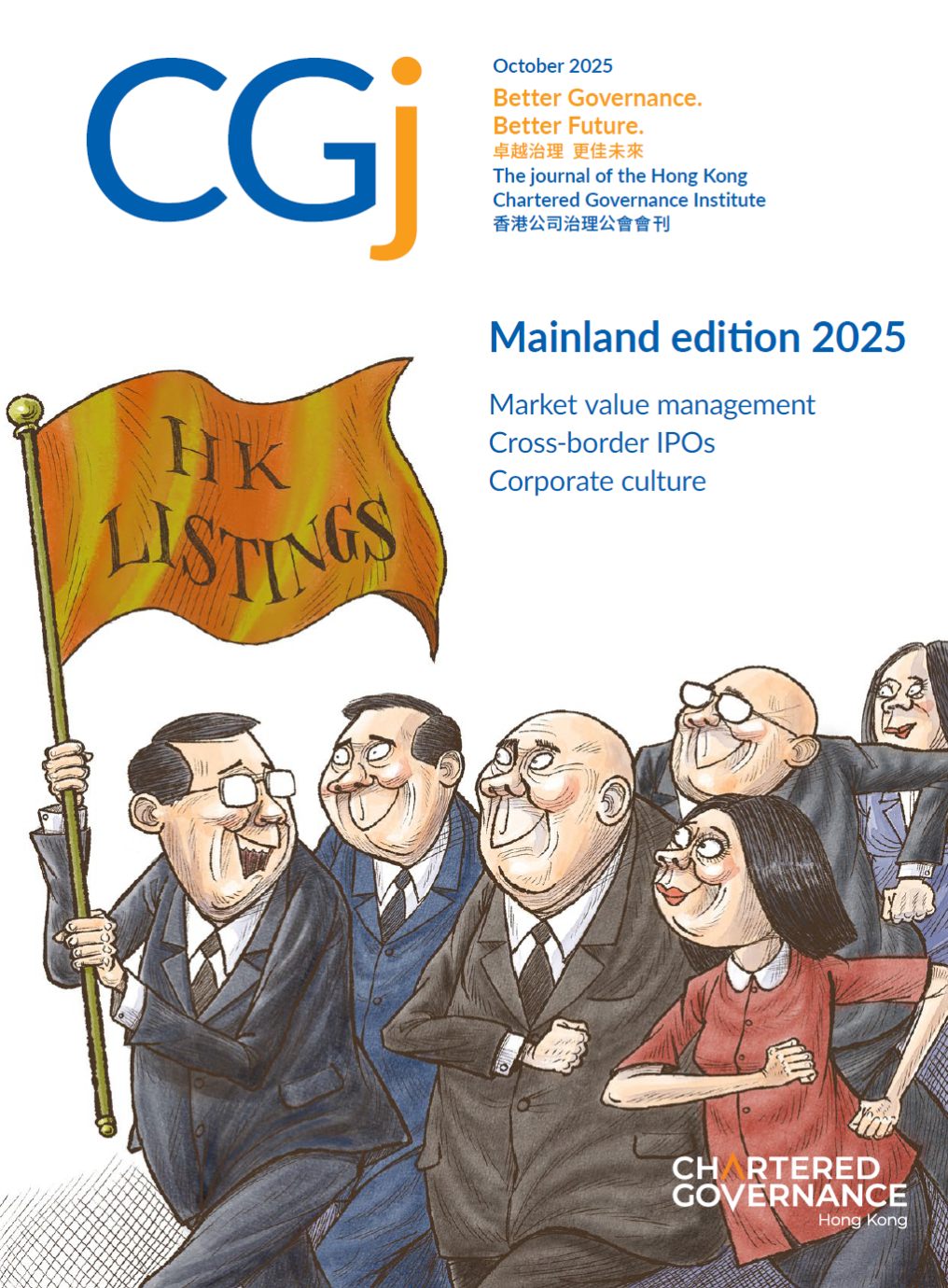
Corporate culture: practical sharing and challenges
CGj reviews an Institute seminar offering practical insights on corporate culture from regulators and industry professionals.
Highlights
- corporate culture is central to effective governance, with regulators expecting companies to align culture with purpose, values and strategy
- shaping culture requires clear values, consistent leadership and everyday practices that reinforce ethical decision-making across all levels of the organisation
- by embedding ethics and compliance into both formal structures and informal staff interactions, organisations can see higher levels of engagement and trust
As global regulators and stakeholders place growing emphasis on the alignment of corporate culture with purpose, values and strategy, governance professionals are under increasing pressure to ensure that culture is not only defined, but is meaningfully embedded across their organisations. To respond to this need, the Institute hosted a seminar on 20 March 2025, titled Corporate Culture: Practical Sharing and Challenges, offering attendees a timely deep dive into the evolving role of culture in governance. The speakers examined the regulatory context, internal governance mechanisms and leadership strategies that shape and sustain corporate culture in today’s organisations.
Corporate culture from a risk advisory perspective
The seminar opened with a presentation from Vivian Chow, Director, Risk Advisory Services, BDO, who began by highlighting the global regulatory focus on corporate culture as a key pillar of governance. ‘Everything points towards a positive and healthy culture being at the heart of good corporate governance – and a healthy corporate culture is essential for achieving long-term sustainability and success.’
Ms Chow described corporate culture as ‘an organisation’s shared beliefs, attitudes and values’, which together shape its unique identity and set it apart from others. It influences internal and external relationships, including how employees interact with each other and how the company engages with customers and stakeholders. Ultimately, culture drives decision-making and plays a key role in achieving company objectives.
At its core, company culture is people-centric. ‘People are at the heart of every organisation,’ Ms Chow stated. ‘A strong culture, aligned with shared values and beliefs, gives the employees a common purpose and drives motivation and engagement.’
She introduced the concept of organisational DNA as the framework that enables the expression of corporate culture. Culture, in turn, drives the evolution of that DNA. ‘Just like DNA in any living organism, culture can evolve and adapt over time,’ she said, noting that leadership changes, market conditions and external pressures are all influential.
To illustrate this dynamic, Ms Chow contrasted two types of organisation – one valuing innovation, where the culture supports open communication and a flat hierarchy, and another with a rigid structure, where top-down decision-making may limit innovation and employee autonomy.
“A strong culture, aligned with shared values and beliefs, gives the employees a common purpose and drives motivation and engagement.”
Vivian Chow
Director, Risk Advisory Services, BDO
Regulatory expectations
Ms Chow then walked participants through the key cultural provisions introduced by The Stock Exchange of Hong Kong Limited (the Exchange) in its January 2022 update to the Corporate Governance Code. The Code requires that a company’s purpose, values and strategy be aligned with its culture, and that directors act with integrity, lead by example and promote the desired culture.
Ms Chow also referenced additional guidance issued in the Corporate Governance Guide for Boards and Directors, issued in May 2025, noting that while there is no one-size-fits-all approach, boards are expected to ensure that culture aligns with business context and that it is clearly communicated throughout the organisation. ‘There should be an appropriate tone from the top, as well as accountability, effective communication and applicable incentive schemes,’ Ms Chow said.
On the issue of disclosure, Ms Chow advised companies to be succinct but meaningful. Recommended areas of disclosure include how culture influences business performance, how it is assessed and monitored, how employees are engaged and how the board is evaluated with respect to cultural alignment.
Ms Chow concluded that it is very important to set core values that an organisation can commit to, based upon which the organisation would be willing to hire and fire. This level of commitment, she emphasised, is foundational to building a sustainable and authentic corporate culture. ‘If you’re willing to make that commitment, then you’re well on your way to building a company culture that is in line with the brand you want to build.’
Corporate culture from an ethics and compliance perspective
Amily Lam, Deputy Head, Corporate Governance, Compliance and Internal Audit Office, Hong Kong Productivity Council (HKPC), offered participants a rare inside look at how a public body with over 1,200 staff and operations across Hong Kong and the Greater Bay Area is proactively cultivating a culture of ethics and compliance from within.
Ms Lam began by clarifying common misconceptions about corporate culture. ‘Culture does not mean working from home every day. Culture does not mean that you can do things whenever you want to, in any way you want to. Culture does not mean making everyone happy. Culture does not mean your supervisor doesn’t hold you accountable.’ Instead, she framed corporate culture as a conscious intervention, one that directly influences daily decision-making across all levels of an organisation.
Citing research by a global HR agency, Ms Lam underlined that positive corporate culture enhances job satisfaction, reduces attrition and supports organisational resilience. ‘Especially in innovation-led sectors, where retaining talent is hard, a good culture makes a real difference,’ she said. She referenced a long-term study by Professor John Kotter that showed companies with performance-enhancing cultures significantly outperformed their peers in revenue, employment and stock price growth over an 11-year period.
Drawing on a widely recognised corporate culture framework from Harvard Business Review, Ms Lam described eight dominant cultural archetypes that organisations often exhibit – caring, purpose, learning, enjoyment, results, authority, safety and order. These styles can be positioned along two intersecting axes, namely how people interact and how they respond to change. ‘Individuals and organisations alike tend to favour a particular way of working – either independently or interdependently – with priority given to maintaining stability or to seeking flexibility,’ she explained.
Importantly, Ms Lam emphasised that no one cultural style is superior to another. ‘There are a lot of different ways to determine or classify culture, and there’s definitely no right or wrong in how you want to define it,’ she said. For organisations unsure of how to begin shaping or evaluating their culture, the framework can act as a reference.
Strategy and tone from the top
Ms Lam drew a direct link between culture and governance by referencing the Committee of Sponsoring Organizations of the Treadway Commission (COSO) internal control framework, which lists commitment to integrity and ethical values as the foundation of a sound control environment. ‘Culture is a way to get things done, whereas corporate governance is a structure of rules, practices and processes used to direct the organisation. Culture is the cornerstone – it’s the foundation of everything that we build and it’s worth investing in,’ she said.
She reiterated that setting the tone from the top is not just helpful but critical. ‘Great cultures aren’t born, they are purposefully designed and built,’ she stressed. ‘First of all, you have to identify very clear values and principles. The management team, including top management, have to lead by example. This value has to be embedded in everyday practices, as well as in decision-making processes.’
Ms Lam specified that HKPC’s cultural transformation journey began with strong top-down support. The initiative received the full support of the organisation’s top management, while the audit committee’s terms of reference were updated to include oversight of the programme.
At the heart of the initiative lies a structured anti-corruption framework covering five key areas – policy and guidelines, risk management, awareness and training, advisory channels, and monitoring and evaluation. ‘This programme translates our commitment into business integrity and everyday practices,’ she affirmed.
A public-facing anti-corruption policy reinforces HKPC’s zero-tolerance stance and outlines expectations for all stakeholders, including contractors and joint-venture partners. Internally, ethics is central, Ms Lam noted, as it sets a clear tone from the top and reinforces organisational priorities.
To bridge the gap between senior management and frontline staff, Ms Lam pointed to effective communication and visibility. She cited a case study from a US-based chain of convenience stores and petrol stations, where executives work in-store one week per year as part of an immersion strategy to remain grounded. ‘Senior management gains a better understanding of frontline challenges, while frontline staff also have the opportunity to engage directly with top executives,’ she said.
Monitoring impact
Ms Lam acknowledged that building ethics and compliance into corporate culture is an ongoing effort. To maintain momentum, HKPC integrates ethical reminders into both formal and informal channels, from onboarding sessions and office circulars to team discussions and storytelling. ‘Changing culture means influencing decision-making, which calls for both robust systems and soft skills,’ she said.
On the formal side, Ms Lam cited reporting structures, policies and procedures, training programmes, and performance management as essential tools. But she stressed that informal channels are equally important when trying to intervene in people’s decision-making. These include behaviour modelling, cross-department networking, and meaningful relationships between supervisors and subordinates. ‘We need effective storytelling strategies to educate colleagues on the importance of integrity, compliance and ethics, as well as the value of focusing on long-term success in preference to short-term KPIs,’ she explained. Even seemingly small details, such as office layout, can play a role in shaping workplace norms and influencing behaviour.
To measure the effectiveness of cultural initiatives, Ms Lam referred to findings from PwC’s Corporate Directors Survey 2024. She noted that directors most commonly track employee turnover and results from engagement surveys. ‘For engagement surveys, corporates could design a few simple questions that are emailed to colleagues every year,’ she suggested, adding that longitudinal data can reveal trends and communication impact over time. She also highlighted the value of 360-degree feedback, particularly for senior executives. ‘It’s important to include peers and subordinates in that process, as this can be a good indicator of your culture programme,’ she said.
“Changing culture means influencing decision-making, which calls for both robust systems and soft skills.”
Amily Lam
Deputy Head, Corporate Governance, Compliance and Internal Audit Office, Hong Kong Productivity Council
Corporate culture for governance and sustainability
Moderated by Matthew Young FCG HKFCG(PE), Institute Council member, and Head of the Corporate Secretarial Department, The Hong Kong Jockey Club, the panel discussion explored how organisational culture, particularly around ESG, ethics and compliance, can be purposefully shaped to support governance and long-term sustainability.
Angel Sze FCG HKFCG(PE), Company Secretary and Head of the ESG Management Committee, Fosun International Ltd, shared how the company fosters an ESG-driven culture through fun, participatory internal campaigns. ‘ESG disclosure cannot be done by one single department,’ she pointed out. ‘By promoting ESG culture internally within the organisation, we can facilitate our disclosure work in a smoother and more efficient manner.’
Fosun organises an annual ESG Culture Week, involving training, quizzes and rewards, as well as an ESG Ambassador Week that brings staff together from across regions to learn more about sustainable development and environmental protection. These efforts build both capacity and ownership. ‘It takes time for colleagues to understand sustainability topics in greater depth, as well as how to explore their own contribution, and how to scale up and speed up their own actions in the process,’ Ms Sze observed.
Ms Chow affirmed that the role of leadership is essential to fostering a desired culture. She described culture-building as a multistep journey, which begins with the board defining the organisation’s values, purpose and beliefs. These are then aligned across the company’s strategy, business model and operations.
‘Culture must be put into practice,’ Ms Chow explained. ‘It needs to be reflected throughout the organisation’s DNA.’ Boards have a monitoring role, but rely on senior management for qualitative and quantitative data to detect red flags like staff turnover, compliance breaches or whistleblowing complaints. ‘No set of policies or procedures will be effective without enforcement, so accountability is very important at all levels,’ she added.
According to Ms Lam, since launching its cultural initiative, HKPC has seen a much higher awareness among its organisational community about what the Council means by ethics and integrity. ‘Our people are now more actively taking these values into account in their everyday decisions.’
Ms Lam also noted definite improvements in staff engagement, feedback and participation. ‘I think colleagues used to be more hesitant to talk with the compliance and internal audit team about any concerns or questions they may have had. Now, however, we are seen as being more approachable and visible, so the employees are far more comfortable coming to us when they are unsure of anything.’
She also believes that governance effectiveness has improved. ‘By improving the quality and capability of decision-making, our practices are more effectively implemented, which supports our long-term success.’
“By promoting ESG culture internally within the organisation, we can facilitate our disclosure work in a smoother and more efficient manner.”
Angel Sze FCG HKFCG(PE)
Company Secretary and Head of the ESG Management Committee, Fosun International Ltd


